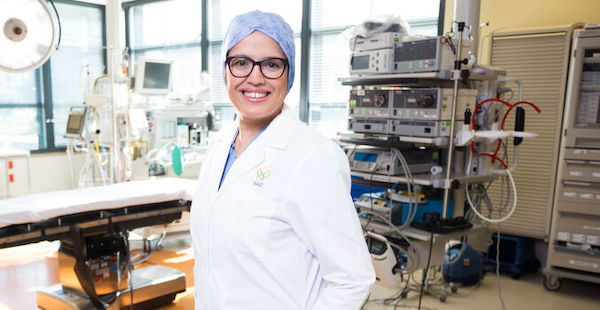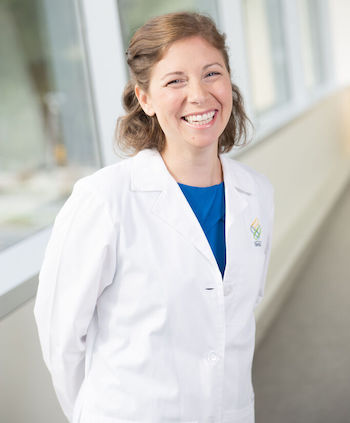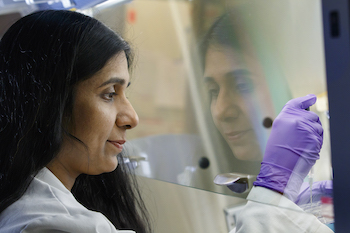What Makes the Knight Cancer Institute Different
Cancer is a physical disease, but it imposes an emotional burden, too. A diagnosis can plunge you into a dizzying whirlwind of acronyms, appointments and uncertainty. It can feel overwhelming.
We get it. At the OHSU Knight Cancer Institute, we focus on treating the whole person. We also base our therapies on the latest research, often led by scientists right here at OHSU. That means we can offer many new therapies as soon as they’re available.

We’re transforming cancer care — again
Precision cancer medicine: The Knight’s Dr. Brian Druker launched the field of precision cancer medicine. He was the lead developer of Gleevec, approved by the FDA in 2001, the first medication to directly target cancer cells. Patients who once faced a deadly leukemia can now live normal lives by taking a daily pill. Hundreds of precision therapies followed.
Finding cancer early: In 2015, Dr. Druker led the Knight in completing the Knight Cancer Challenge, matching a $500 million gift from Phil and Penny Knight. Dr. Druker began attracting some of the world’s top scientists to OHSU for a mission to find cancer early. A blood test that could help spot pancreatic cancer early is just one result.
A new model in patient care: In 2025, Dr. Druker and the Knight are preparing to transform cancer care yet again. Thanks to a historic $2 billion gift from the Knights, Dr. Druker is building a new model in fully integrated cancer care. He envisions surrounding patients with every resource, from faster diagnosis to clinical trials to psychological, genetic and financial counseling.
Our doctors are leaders in their fields
Skilled surgeons: We have more than 30 expert cancer surgeons skilled in many complex procedures. We’re leaders in robotic surgery, reconstructive surgery and minimally invasive surgery. In some cases, there’s no incision at all.
Cell transplants: We’ve done more than 4,500 bone marrow and stem cell transplants. That ranks us among the top 20 U.S. centers by volume.
Immunotherapy: We helped lead the first study to show CAR T-cell therapy treats a type of leukemia. We were the first center in the world to use natural killer cell therapy (NK therapy) in a patient with advanced lymphoma. We were also among the first in the nation to use immunotherapy to treat patients with advanced prostate cancer.
Mohs surgery: We’re national leaders in Mohs surgery for skin cancer. Mohs is more complex than other types of skin cancer surgery, but it offers high success rates and spares more healthy skin, for smaller scars.
Breast reconstruction: For some breast cancer patients, we can sculpt a breast from the patient’s own tissue. This results in an exceptionally realistic breast with no implant to eventually replace.
Sparing limbs: For patients with sarcoma, we’re experts at replacing bones and rebuilding limbs. We use bone from another part of the body or 3D-printed synthetic bone.
Prostate cancer: We pioneered a therapy for the most aggressive and deadly form of prostate cancer, and were central to getting it approved by the Food and Drug Administration. Since 2011, we’ve helped develop five new therapies for prostate cancer that were approved by the FDA.
We treat the person as well as the disease

Team-based care: Patients who come to the Knight Cancer Institute are treated by teams of specialists who work together. Your cancer and treatment options will be considered from every angle.
A wide range of services: At the Knight, you’ll find:
- Nurse navigators to guide patients through treatment
- Dietitians to support your nutrition
- Physical therapists to help you build or regain strength and skills
- Palliative care specialists to ease pain and anxiety
- Patient education, support groups, acupuncture, yoga and more
Guest house: The Rood Family Pavilion offers a home away from home with family suites and a rooftop playground. We have many resources for caregivers and families.
Meeting the needs of young people: A pioneering cancer program for adolescents and young adults is a national model.
Social work: Cancer can put a strain on relationships and finances. Our social workers can help resolve conflicts. They also offer advocacy, resources and compassion to support you.
We turn discoveries into treatments

Clinical trials: You’ll find more than 400 clinical trials to test new therapies and approaches. This gives you access to the latest treatments. Your care team will help you decide if a trial is right for you.
Precision medicine: We’re applying the principles of targeted therapy and precision cancer medicine to more cancers than ever.
New hope for lymphoma: Dr. Richard Maziarz, director of our cell therapy program, played a central role in developing CAR T-cell therapy to treat an aggressive type of lymphoma.
Creating bone tissue: We’re developing a material that replicates human bone tissue, potentially serving as treatment for large bone injuries. It snaps together like a Lego.